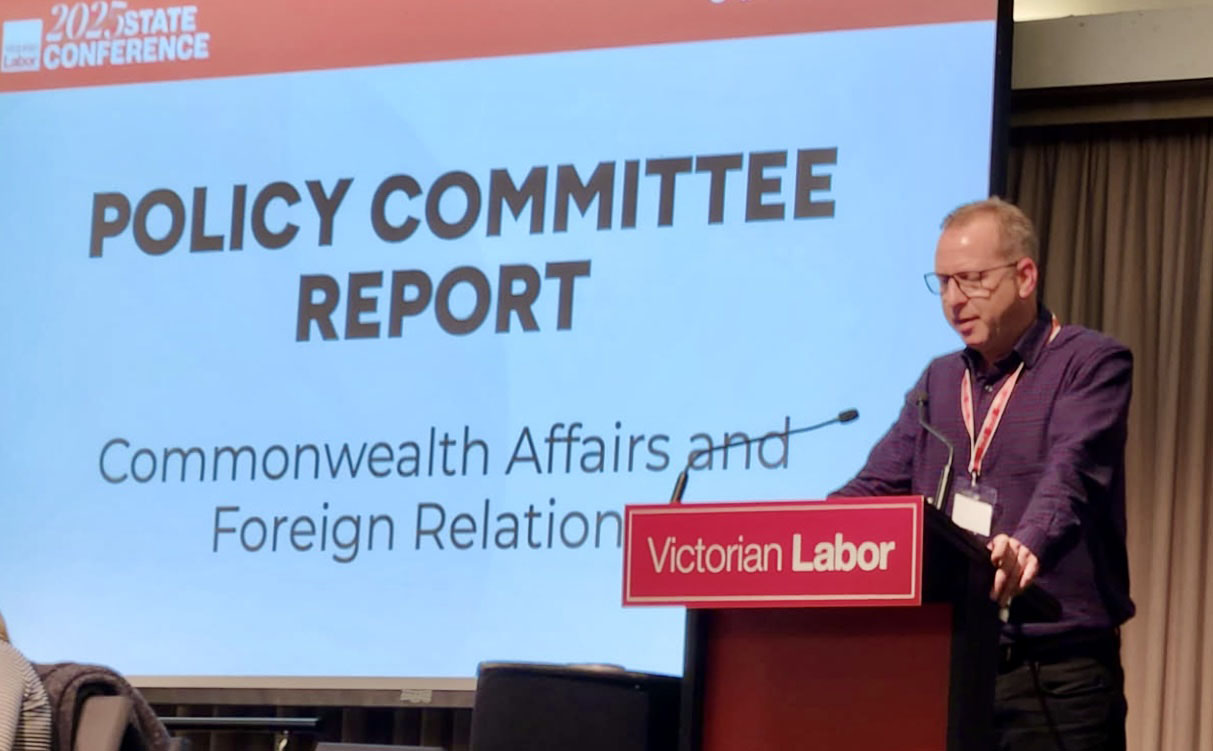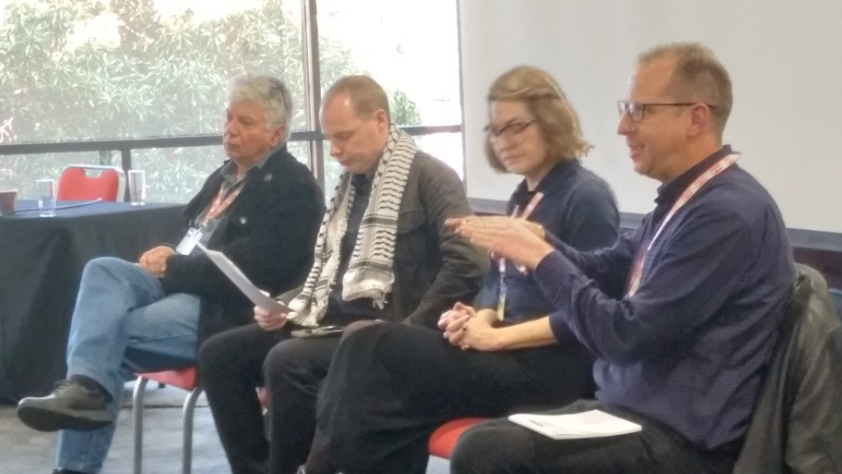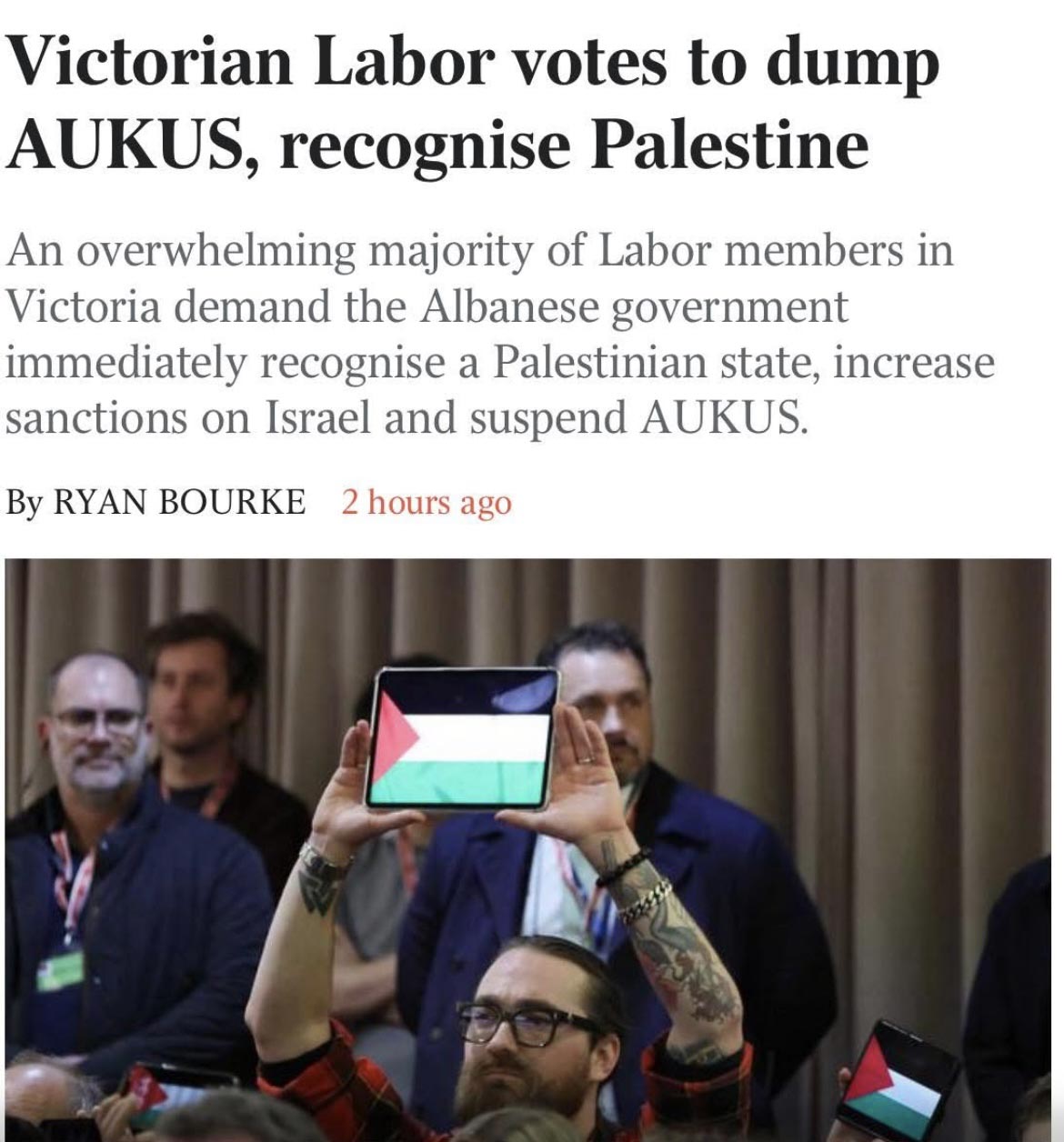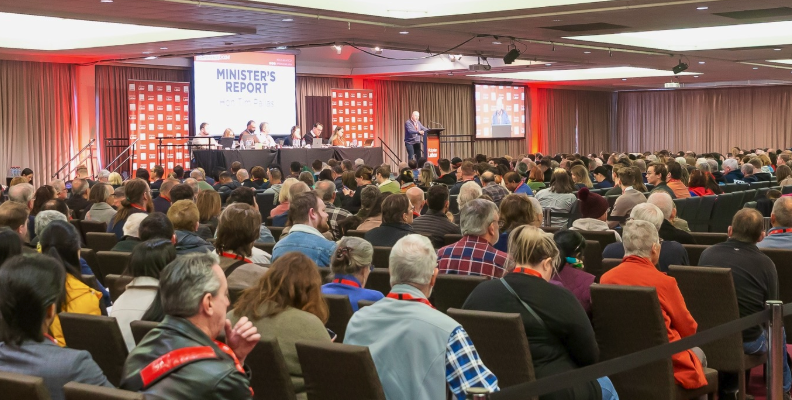Hamish McPherson was an elected delegate to the Victorian ALP State Conference in August, representing Indi electorate. As Victoria Convenor of Labor Against War, Hamish successfully steered LAW supported motions through conference with the support of delegates from branches and unions.
Hamish provides here his thoughts on conference.

Six hundred delegates attended the Victorian Labor State Conference (2-3 August); half being elected by local branch members and half representing affiliated trade unions. Hundreds of other members attended as observers, indicating a genuine interest in the democratic process of their party.
What motivated those attending to forgo leisure time, kids’ soccer matches and cafe catch-ups, in favour of a conference devoted to policy making? Perhaps to cash the promissory note of membership – that one has a voice in collectively shaping the direction of the party.
The democratic forums of party branches, electorate councils and conferences certainly remain a key feature of the political life and culture of the ALP. This arose from the formation of the Labor Party – conceived as a political instrument for realising the political goals of the workers’ union movement.
The principle that elected Labor MPs should act as directed by the collective decisions of the labour movement was an innovation that challenged the dominant liberal model of parliamentary representation.
Even today this theoretical subordination of MPs to the party and the labour movement causes conservatives to froth about ‘union domination’. It also challenges the newly fashionable, but old liberal idea of electing well-intentioned independents to individually represent an amorphous ‘community’ interest.
Ministerial power over ALP
However, as far back as 1923, the Australian Labor activist, socialist and prehistorian Vere Gordon Childe noticed a gap between theory and reality. In his work of that year How Labor Governs Childe observed that the electoral pragmatism of the parliamentary party came to dominate the party and movement, not visa versa. Power tended to concentrate in ministers’ offices, and time and again the party and movement had great difficulty making any Labor ministry comply with their democratic will.
Fast forward to 2025 – how well did the Victorian state conference fulfill the promise of providing a forum for democratic decision making? To what extent does the party membership and unions control the actions of their elected representatives, if at all?
I attended conference as an elected branch delegate from the Indi electorate in northeast regional Victoria. I was also present in my capacity as convener of Labor Against War (Victoria). These mandates merged as I had raised opposition to AUKUS in the branches in Indi and always found solid opposition among rank-and-file members to this misguided military pact.
Based on experience, I also knew my regional comrades would support more robust policies to advance the interests of working people and the majority, and to challenge the various inequalities and dysfunctions that exist in society.
I caucused as a member of the Socialist Left (SL) faction, having joined a few years ago seeking political dialogue and a means to advance support for left positions. The SL seems to wake from a general political slumber in the lead up to conferences, becoming animated by the process of raising various social democratic policy matters.
This distinguishes the SL from the right factions which, apart from a few right aligned unions, tend to show little interest in policy questions and devote most of their effort to dampen any open dissent from the ministries’ line. They are also demoralised, as the SL currently commands a working majority in Victoria, with the support of SL-aligned unions and independent delegates.
Before the 2024 Conference, I had put the case against AUKUS at an SL General Meeting, focusing on the entanglement with US war aims in Asia. I found general support from members but faced push-back from a Left MP who warned about “parroting” the Beijing line in foreign policy matters! This crude argument had not played well with the assembled comrades.
At the 2024 Conference we became entangled in direct negotiations with Defence Minister Richard Marles’ office about the substance of our anti-AUKUS resolution. This was brokered by a Left union official and followed the well-worn path of Labor deal making. The result had been a shabby compromise that the Minister for Defence and the Right could support, one that did not clearly oppose AUKUS.
Deal making trumps political clarity
This culture of deal making, of compromise in the interests of ‘unity’, is deeply entrenched in the Labor Party’s culture. It reveals the essential nature of a party that seeks to reconcile the interests of its working-class base with capital and the existing state.
This year we vowed to more assertively hold the line on our key demands – for an independent parliamentary inquiry into AUKUS and for withdrawal from this US-led war pact.
In preparation for conference, I made the case against AUKUS at a SL Policy Forum, well-attended branch meetings and in discussions with union delegates and officials. I found that opposition to AUKUS had hardened, and the SL faction endorsed our Labor Against War policy and urgency resolution.
Widespread unease about Donald Trump’s return to the White House, which had been politically damaging to Dutton and helped fuel Labor’s 3 May win, had sharpened focus on the dangers of a military pact with an unstable “America First” power.
Labor Against War had two irons in the fire; an urgency resolution and an AUKUS policy that was accepted as part of the official report of the Commonwealth and Federal Relations Policy Committee. Submitting policy had been suggested by an SL organiser, as the purpose of the 2025 Conference was to decide policy to inform Victorian Labor’s platform for the next state election.
At this point the right faction attempted to use Agenda Committee to shove the AUKUS and Palestine debates from Saturday afternoon to the ‘death zone’ of Sunday afternoon. However, SL delegates on Agenda Committee pushed back and stopped the right’s sabotage.
In the final week before conference we faced serious pressure from ministers to drop our key demands. The Foreign Minister’s office was in a state of mild panic about the resolution’s description of Trump as an ‘unstable’ and ‘authoritarian’ leader. They were concerned that this could offend Trump just as he was weighing up further tariffs on Australia.
This intervention by a nominally ‘left’ minister carried weight with leading figures in the SL faction and, in the interests of advancing our core demands, it was agreed to remove references to Trump. Thus, the slippery path begins.
Then Marles’ office stepped in, unsurprisingly objecting to our call to withdraw from AUKUS. His staffers began working the phones and twisting arms, calling trade union leaders to demand they pull support. This caused the United Workers Union and other unions to get cold feet. Without their support the resolution would fail to reach conference floor for a vote, and likely instead be quietly ‘referred’ to the National Policy Forum and buried.
Holding the line
At this point I decided to hold the line and told allies that we wouldn’t budge on our key demand. If the resolution went down as a result, then so be it, the blame would lie elsewhere.
Within hours, I was contacted by a key SL aligned union official who persuasively argued that the Socialist Left was committed to opposing AUKUS and that it would be better to pass a resolution opposing the pact than give the Right a win.
This led to a last round of negotiations in the final 48 hours, culminating in a meeting at 7.45am on Saturday morning, just before the SL caucus meeting. There I met with three SL aligned MPs, Andrew Giles, Julian Hill and Ged Kearney. Also present were the two SL factional conveners and an SL aligned union official.
The gist of the matter, as presented by the MPs was that while AUKUS was a legitimate matter for debate, we should be mindful of not openly humiliating the federal government.
I stated my democratic mandate to oppose AUKUS; from Indi FEA members, SL members and as LAW convener. I reminded them of concessions we had already made. I asserted that the right place to make decisions was democratically on the floor of conference, not behind closed doors (or literally behind a curtain in the catering kitchen!).
The MPs presented a choice; we could agree to a slight moderation of words and have factional support to take the resolution to conference floor, or they would not oppose the resolution being referred away to die a quiet death. I chose the first option.
The compromise was adding (italicised), “There are serious concerns that AUKUS is not compatible” with an “independent foreign and defence policy and a reliable domestic defence industry” and that “State Conference recommends that the National Conference consider removing ‘including AUKUS’ from point 25, Chapter 7, ‘Australia’s Place in a Changing World’.”
The deal was done, and the SL caucus was reconvened lunchtime Saturday to announce that the faction would be firmly backing the anti-AUKUS resolution and policy.
The episode revealed the limitations imposed on democracy in the Labor Party. It also showed the dual nature of the official Left faction; partly a conduit for dissent and advancing left policy, but also a site mediating the essentially opposing interests of the party’s working-class base and those of the ALP leadership and the Australian capitalist state.
When it came to the crunch, the Left MPs held a veto over the decisions of the SL faction and could override the previous decisions of the faction’s membership. In my view, this power relationship should be completely reversed.
There was a final impediment to the LAW resolution based on party rules, which stipulate that resolutions referring to the National Platform require a statutory majority of delegates on Conference floor. I was advised that there were unlikely to be 300+ supportive delegates on the floor at 4.30pm Saturday afternoon and that the resolution would thus be declared invalid by the chair. This led to the National Platform reference being pulled from the resolution.
When Richard Marles had addressed the conference, many delegates and observers engaged in a silent protest by holding up mobiles and devices displaying the Palestinian flag. Marles’ displeasure was evident, and conference security moved to eject some observers, underlining the undemocratic effects of security arrangements.
Fringe meetings

Despite this, both Labor Against War and Labor Friends of Palestine separately held successful Fringe Meetings, each attended by more than 50 delegates and observers, enabling political discussion and education to freely occur.
Finally, the time came to move the anti-AUKUS Policy and Resolution on the floor of conference. The policy included the full Labor Against War demands and seemed to have somehow escaped the scrutiny of the ministers’ offices.
Following short sharp speeches, mine condemning AUKUS as a pact for US-led war in Asia, both were passed resoundingly with the support of a clear majority of delegates, including independents and the left delegates and affiliated unions.
The same session of conference voted overwhelmingly for strong pro-Palestine resolutions including the demand for sanctions on the Israeli government, an end to all trade in military goods and a full review of all relations with Israel and action to stop Australian entities aiding or abetting the occupation.
These victories were greeted by resounding applause from delegates and were rightly perceived as an achievement by our section of the labour movement. They were won by rank-and-file delegates asserting their democratic rights in the face of concerted opposition from the ministerial leadership of the Labor Party.
The experience of organising in the Labor Party against imperialism and war has shown that it is a useful site of political struggle. The contradictions at the heart of the party, between representing working class interests, and managing the existing capitalist order are too often resolved in favour of the powers that be.
However, the assertive expression of the democratic will of the rank-and-file and union members is the base we stand and fight on. We seek unity not based on compromise with the system, but around core democratic and socialist demands.
To adapt an old labour movement maxim: “Unity of Labour is the Hope of the World: for democracy, peace and socialism!”


